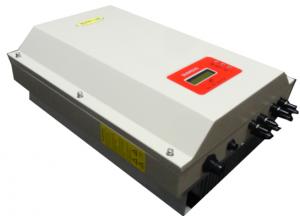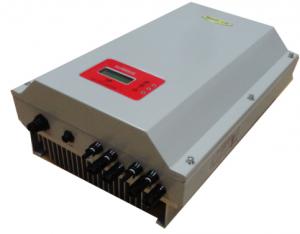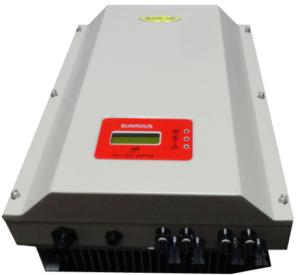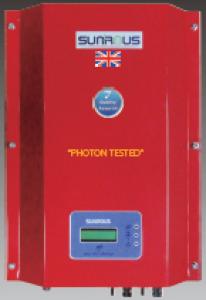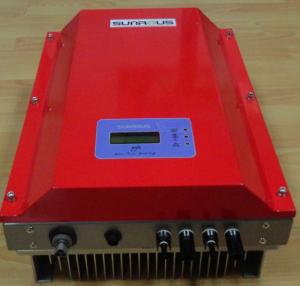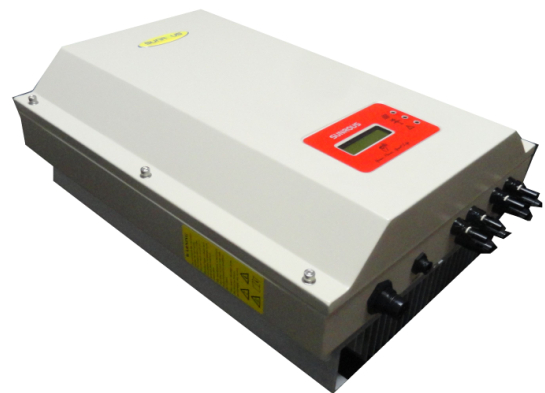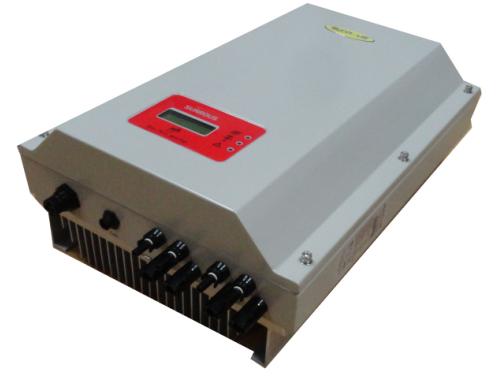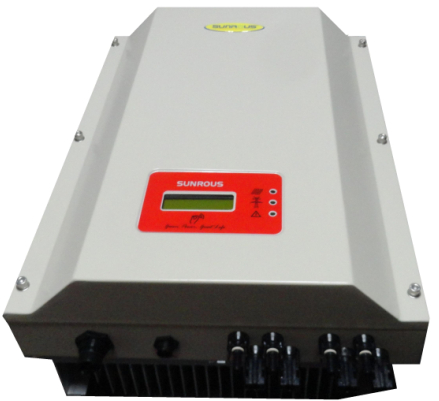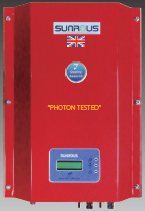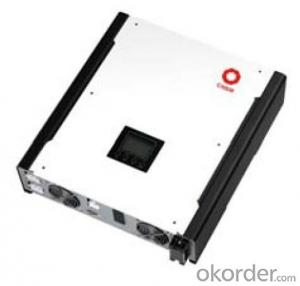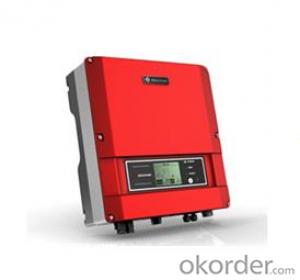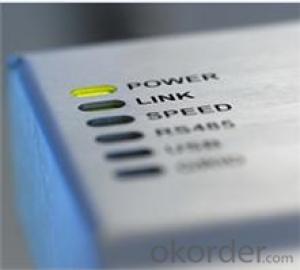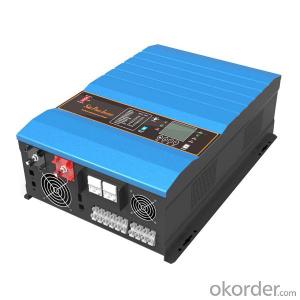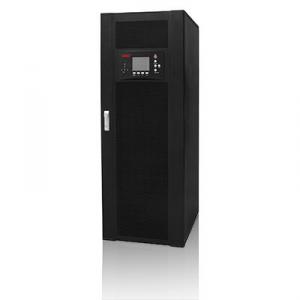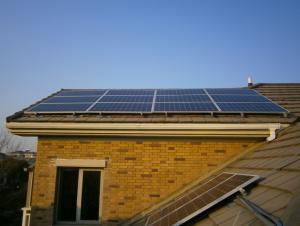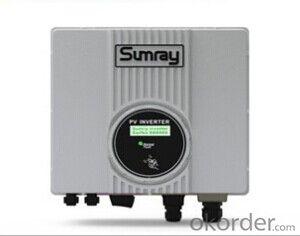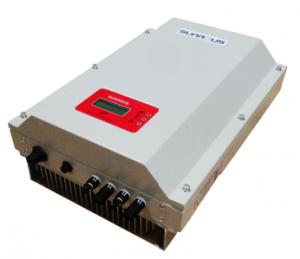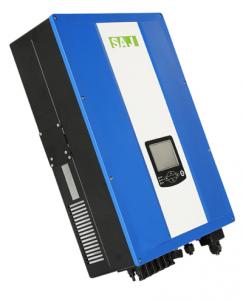16kw Grid-Tied Inverter Dual MPPT Made in China with Good Price
- Loading Port:
- Shanghai
- Payment Terms:
- TT or LC
- Min Order Qty:
- 100 mm
- Supply Capability:
- 500 mm/month
OKorder Service Pledge
OKorder Financial Service
You Might Also Like
·High frequency transformer isolation and conversion efficiency rate up to 97%.
·Dual input sections with independent MPP tracking, allows optimal energy harvesting from two sub-arrays oriented in different directions
· High speed and precise MPPT algorithm for real time power tracking and improved energy harvesting, as well as regular MPP Adaptation Efficiency of over 99.0%.
·Flat efficiency curves ensure high efficiency at all output levels ensuring consistent and stable performance across the entire input voltage and output power range
·Wide input DC MPPT range(150V~550V)/output AC voltage range (180V~264V)
·IP 65/NEMA 3R, outdoor enclosure for unrestricted use under any environmental conditions
·Any modules can be used and fit in this device whether crystalline or thin-film.
·Use in residential applications requiring PV array plug-in grounding.
·RS-485 communication interface (designed for connection to computer or data-logger)
·Easy to install and operate with reduced weight.
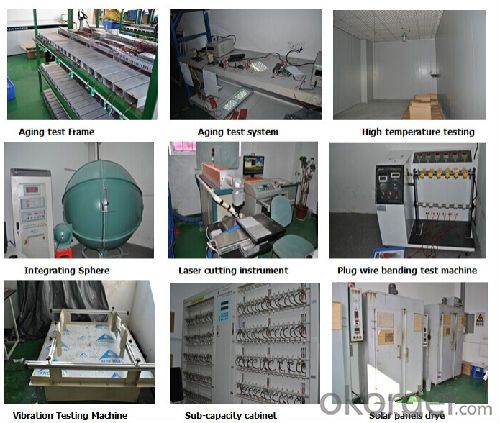
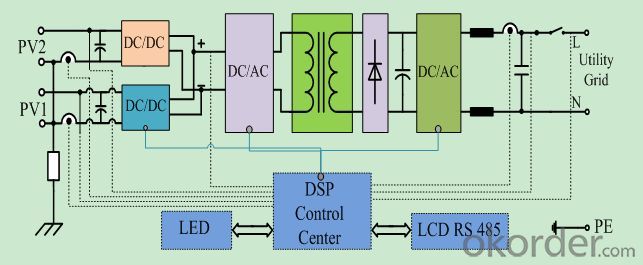
High frequency transformer isolation is the main feature of our production, which makes Installation easier due to the reduced weight and higher conversion effciency because of omitting Low frequency transformer. The wide input voltage range from 180 to 600voltage gives you extraordinary fexibility for you system design. Not need to set graphic display and RS485 communication system make the devices highly user-friendly.
This product can by multi-level parallel combination for 6kw to 20kw needed any power grade HF series technical parameter.
certificates:
American ETL certification
- GT2.0-ZX-01/HF
- GT3.0-ZX-01/HF
The European TUV certification
- GT2.0-ZX-01
- GT2.5-ZX-01
- GT3.0-ZX-01
The British G59 authentication
- GT3.8-ZX-01
- GT5.0-ZX-01
The British G83 authentication
- GT2.0-ZX-01
- GT2.5-ZX-01
- GT3.0-ZX-01
Model No. | PR-SAS300 |
Polycrystalline solar panel | 2pcs 75Wp parallel |
Max. solar panel charging voltage | 17.6V |
Max. solar panel charging current | 8.54A |
Inverter output | Pure sine wave 300W |
Inverter peak start | 900W (3s) |
Inverter output voltage/frequency | 220V/50Hz |
Inverter AC charger | 12V/10A |
Solar charge controller | 12V/15A |
Cabinet material | Steel box of zinc-plated and lacquer-coated |
Battery type | Deep cycle maintenance free |
Battery capacity | 1 x 12V 100Ah |
Operating temperature | -20oC-55oC |
Packing for solar panel | 0.06cbm/20kg |
Packing for integrated solar charge control inverter cabinet | 0.11cbm/15kg |
Packing for battery | 0.02cbm/31kg |
Whole system per set | 0.19cbm/66kg |
Optional monitoring software | CD-ROM for computer and SNMP card for internet |
Q1 : What is you advantages
A1:
a).We are professional ups manufacturer for more than ten years and we have these staffs with rich
production and R&D
b) Excellent workers and skilled engineers
c).Our aims are to provide every customer high quality, reasonable price and excellent
service.
d)we can guarantee to send the goods on time. And also accept any transportation ways that
you require
Q2 : How do you control the production quality
A2:
a) For materials, we have IQC departments and the IQC testing follow MIL-STD-105E standard
b) in production have 4 times function testing
c) all of our products with 100% burn-in testing
d) 100% QC testing before delivery
- Q: Can a solar inverter be used with a solar-powered lighting system?
- Yes, a solar inverter can be used with a solar-powered lighting system. A solar inverter is responsible for converting the direct current (DC) energy generated by the solar panels into usable alternating current (AC) electricity. This AC electricity can then be utilized by the lighting system for illumination.
- Q: Can a solar inverter be used with different solar panel types?
- Yes, a solar inverter can generally be used with different solar panel types as long as the electrical specifications of the panels are compatible with the inverter. However, it is important to ensure that the voltage, current, and power ratings of the panels are within the acceptable range for the specific inverter model to ensure optimal performance and safety.
- Q: Can a solar inverter be used with a solar-powered agriculture system?
- Yes, a solar inverter can be used with a solar-powered agriculture system. A solar inverter is an essential component that converts the direct current (DC) electricity generated by solar panels into alternating current (AC) electricity, which is compatible with most electrical appliances and equipment. In the context of a solar-powered agriculture system, a solar inverter would be necessary to convert the electricity produced by the solar panels into the appropriate form for powering agricultural machinery, irrigation systems, or any other electrical needs on the farm.
- Q: Can a solar inverter be used in a three-phase power system?
- Yes, a solar inverter can be used in a three-phase power system. In fact, there are specific types of solar inverters designed to work with three-phase power systems. These inverters are capable of converting the DC power generated by solar panels into AC power, which can be seamlessly integrated into the three-phase power grid.
- Q: Can a solar inverter be used in areas with high temperature fluctuations?
- Yes, a solar inverter can generally be used in areas with high temperature fluctuations. Solar inverters are designed to operate in a wide range of temperature conditions, typically between -20°C to 50°C (-4°F to 122°F), depending on the specific model. They are built with temperature protection mechanisms to ensure their functionality and durability even in extreme temperature variations. However, it is important to note that prolonged exposure to extreme temperatures at the upper or lower limits of their operating range can affect the performance and lifespan of the inverter. Therefore, proper installation and regular maintenance are crucial to ensure optimal performance in areas with high temperature fluctuations.
- Q: Can a solar inverter work without sunlight?
- No, a solar inverter cannot work without sunlight as it relies on solar energy to convert the direct current (DC) produced by solar panels into alternating current (AC) for use in homes and businesses.
- Q: How do you connect a solar inverter to solar panels?
- To connect a solar inverter to solar panels, you need to follow a few steps. First, ensure that the solar panels are properly installed and positioned to receive maximum sunlight. Then, connect the positive and negative terminals of the solar panels to the corresponding terminals on the solar inverter. Make sure to use appropriate cables and connectors for a secure connection. Once the connections are made, the solar inverter will convert the solar energy generated by the panels into usable electricity for your home or business.
- Q: Three-phase photovoltaic inverter grid, the use of phase-locked loop is what?
- Photovoltaic inverters for grid-connected photovoltaic power generation systems are primarily capable of receiving DC power from photovoltaic arrays and converting them into sine-wave currents of the same frequency and in phase with the access grid for powering the grid or local loads.
- Q: Can a solar inverter be used in areas with unstable grid connections?
- Yes, a solar inverter can be used in areas with unstable grid connections. Solar inverters are designed to handle fluctuations and interruptions in the grid power supply. They typically have built-in features such as anti-islanding protection and grid support functionalities that ensure safe operation even in areas with unreliable grid connections. These inverters can switch seamlessly between grid power and solar power, providing a consistent power supply to the connected loads in such areas.
- Q: What is the role of a solar inverter in a solar panel system?
- The role of a solar inverter in a solar panel system is to convert the direct current (DC) electricity generated by the solar panels into alternating current (AC) electricity that can be used to power household appliances and be fed back into the electrical grid. It also ensures that the electricity produced by the solar panels is of the correct voltage and frequency for safe and efficient use in homes and businesses.
Send your message to us
16kw Grid-Tied Inverter Dual MPPT Made in China with Good Price
- Loading Port:
- Shanghai
- Payment Terms:
- TT or LC
- Min Order Qty:
- 100 mm
- Supply Capability:
- 500 mm/month
OKorder Service Pledge
OKorder Financial Service
Similar products
Hot products
Hot Searches
Related keywords
